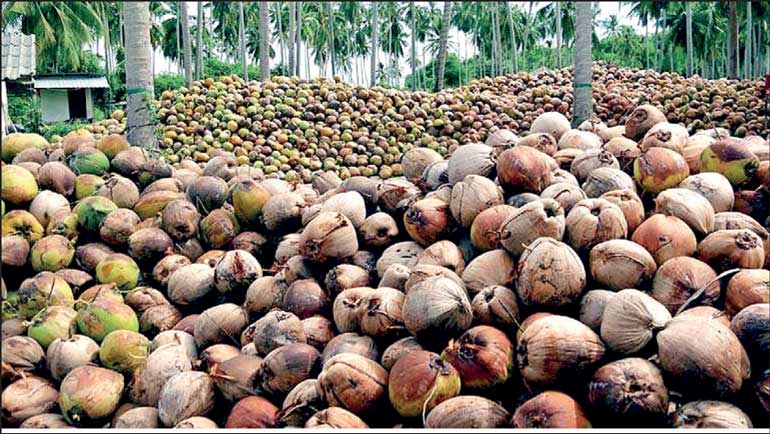Monday Feb 23, 2026
Monday Feb 23, 2026
Friday, 1 August 2025 00:22 - - {{hitsCtrl.values.hits}}

Sri Lanka cannot continue to celebrate its status as a global coconut leader while ignoring the inequities faced by its primary producers
 Strategic importance of the coconut industry
Strategic importance of the coconut industry
Sri Lanka’s coconut industry stands as a cornerstone of the national economy deeply rooted in its cultural heritage, rural livelihoods, and food security. Encompassing over 409,000 hectares and producing close to three billion coconuts annually, the sector provides essential employment, stabilises rural communities, and earns valuable foreign exchange. In 2024 alone, Sri Lanka generated $ 856 million from coconut and coconut-based exports, reaffirming its global leadership as the number one exporter of coconut milk, cream, and powder; second in coir products; and third in desiccated coconut.
However, beneath this international success lies a sobering reality: the very growers especially smallholders who form the backbone of this industry are being systematically marginalised by a flawed pricing mechanism. While export revenue saw a modest uptick in 2024, the longer-term trend tells a different story. Earnings have dropped steadily from $ 836 million in 2021 to $ 817 million in 2022, and further down to $ 709 million in 2023. Though shifts in global demand have played a role, the root causes are domestic centred on inefficiencies and a deeply flawed auction system overseen by the Coconut Development Authority (CDA).
Broken auction mechanism
What was initially designed to ensure transparent and competitive pricing has evolved into a system that favours a privileged few. From 2021 to 2024, less than 1% of the national coconut harvest passed through the official auction mechanism. In 2021, just 22.5 million coconuts equivalent to 0.75% of national production were sold via auction. Participation rose slightly to 1.31% in 2022, only to fall again to 0.67% by 2024. The majority of smallholder farmers who account for over 90% of the country’s coconut land remain excluded, primarily due to logistical, financial, and administrative barriers. Farmers in key producing districts such as Kurunegala, Gampaha, and Puttalam are unable to access the system due to high transport costs, poor infrastructure, bureaucratic red tape, and lack of market information. Left with no viable alternatives, they are forced to sell to intermediaries who offer significantly lower prices.
Compounding the issue, the auction is dominated by coconuts from inefficient, State-run estates. Despite their lower quality, these lots are used to set national price benchmarks skewing the market and undervaluing higher-grade produce from smallholder farms. While auction prices hover between Rs. 80-100 per nut, coconuts in Colombo retail for Rs. 150-200. Intermediaries exploit this discrepancy to justify further reductions in farmgate prices, trapping growers in a cycle of underpayment and financial hardship.
This disparity cannot be attributed to taxes or transport costs alone; it exposes the deep inefficiencies and profiteering embedded within the supply chain. With input costs for fertiliser, fuel, and labour steadily rising, many smallholders now struggle to break even. Some have already reduced their output or left the sector entirely posing a serious threat to the long-term sustainability of the industry.
Control over the auction system is concentrated in the hands of a few brokers, many affiliated with large-scale processors, exporters, or millers. This power imbalance enables price manipulation and suppresses competition. Farmers frequently report being subjected to vague justifications for price reductions such as buyer delays or market constraints without any recourse or alternative channel. Rather than serving as impartial intermediaries, brokers often act as profit-driven gatekeepers, claiming a disproportionate share of value while growers absorb all the risk.
Learning from other commodities
 By comparison, other key Sri Lankan commodities operate with greater fairness and efficiency. The tea industry, for instance, benefits from auctions aligned with international grading standards. Rubber pricing is indexed to transparent global benchmarks in Bangkok and Singapore. These models promote quality, ensure transparency, and deliver better value to producers. The coconut auction system, however, remains opaque and outdated failing both farmers and the broader economy.
By comparison, other key Sri Lankan commodities operate with greater fairness and efficiency. The tea industry, for instance, benefits from auctions aligned with international grading standards. Rubber pricing is indexed to transparent global benchmarks in Bangkok and Singapore. These models promote quality, ensure transparency, and deliver better value to producers. The coconut auction system, however, remains opaque and outdated failing both farmers and the broader economy.
While some argue including state that low auction prices help protect domestic consumers, this justification falters in the face of persistently high retail prices and declining farmgate earnings. In reality, it is the intermediaries’ brokers and large buyers who benefit most from the current structure. Without meaningful reform, this imbalance will continue to erode rural incomes and undermine Sri Lanka’s competitiveness in the global coconut industry.
Path to reforms
Reform is both urgent and achievable. The CDA must take immediate steps to democratise participation by simplifying registration for smallholder cooperatives and eliminating bureaucratic obstacles. Establishing regional auction centres and digital platforms will help ease transport burdens and expand access. Transparency must be strengthened through the publication of a wider set of pricing data, including farmgate, wholesale, and export rates. Strict regulation of brokers requiring the disclosure of affiliations, commissions, and pricing practices is essential to restoring trust in the system. At the same time, farmers must be empowered through improved logistics, training, and post-harvest infrastructure to compete on fairer terms.
Millers who depend on consistent, high-quality coconut supply also have a constructive role to play. By publicly disclosing procurement prices and engaging directly with certified cooperatives, they can reduce reliance on opaque broker networks and help foster ethical, traceable supply chains. Participation in fair-trade and sustainability certification programs will enhance both product quality and long-term supply security while also strengthening brand reputation in global markets.
The role of the State cannot be overlooked. While State-managed estates are often mandated to sell through the auction system to ensure accountability and standardised pricing, artificially low benchmarks undermine their own returns. In effect, the government ends up using vital export revenue to subsidise systemic inefficiencies rather than reinvesting in innovation, infrastructure, or grower welfare. A strong, credible, and inclusive auction model benefits not only producers, but also the State’s fiscal health and strategic goals.
Time-sensitive need
Sri Lanka cannot continue to celebrate its status as a global coconut leader while ignoring the inequities faced by its primary producers. The auction system, in its current form, does more harm than good distorting prices, discouraging production, and eroding trust. Reform is not just a policy choice it is a national imperative. Protecting and empowering the growers who sustain this industry is the first step toward building a more just, resilient, and prosperous future for Sri Lanka’s coconut sector.
(The writer is an Engineer with 20 years of military service and nearly two decades as Defence Cooperation Specialist at a foreign mission in Sri Lanka. He is a Fellow of the Institute of Incorporated Engineers, Sri Lanka, and holds an MBA from the Postgraduate Institute of Business Administration (PIM) at the University of Sri Jayewardenepura, along with a Master’s degree in International Relations from the University of Colombo. He has developed his coconut estate into a Model Estate in the Puttalam District. He believes in sustainable and innovative farming and agriculture. He can be reached via email: [email protected].)